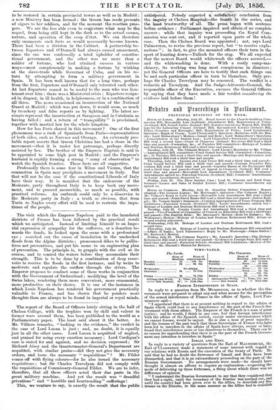The report of the Board of Officers lately sitting in
the hall of Chelsea College, with the trophies won by skill and valour in former wars around them, has been published to the world as a Parliamentary paper. The least said about it the better. As Mr. Villiers remarks, "looking• to the evidence," the verdict in the case of Lord Lucan is just ; and, no doubt, it is equally just in all the other cases. Lord. Lucan is acquitted of neglect, and praised for using every exertion- necessary ; Lord Cardigan's case is stated for and against, and no decision expressed.; Sir Richard Airey and the Quartermaster-General's Department are acquitted, with similar praise did they not give the necessary orders, and issue the necessary " requisitions " ? Mr. Filder comes WE with flying colours—for he also issued the necessary requisitions ; but Sir Charles Trevelyan did not comply with the requisitions of Commissary-General Filder. We are to infer, therefore, that all these officers acted their due parts in the great military machine. And yet the result was " dreadful privations " and " horrible and heartrending" sufferings !
This, we venture- to say, is exactly the result that the public
anticipated. Nobody expected a satisfactory conclusion from the inquiry at Chelsea Hospital—the fourth in the series, and the least trustworthy ot all. 1:he press began with sentence before evidence ; Parliament inquired and. obtain 3d no complete answer ; while that inquiry was proceeding the Royal Com- mission was sent out, and it reported upon parts of the whole case. Then the Chelsea Board was appointed ; not, says Lord Palmerston, to revise the previous report, but " to receive expla- nations " ; in fact, to give the mounted officers their turn in the sport of hunting down—Tullooh for the stag. We all expected that the newest Board would whitewash the officers accused,— and the whitewashing is done. With a costly camp-ma- chinery, its working was long most conspicuous in disasters; yet the General Officers are here to testify that such things can be and each particular officer in turn be blameless. Only per- haps Sir Charles Trevelyan may be censured. The verdict is a reductio ad Trevelyan. And the Judge-Advocate-General, the responsible officer of the Executive, excuses the General' Officers by saying that they have made a fair verdict considering tlit: evidence laid before them!


























 Previous page
Previous page